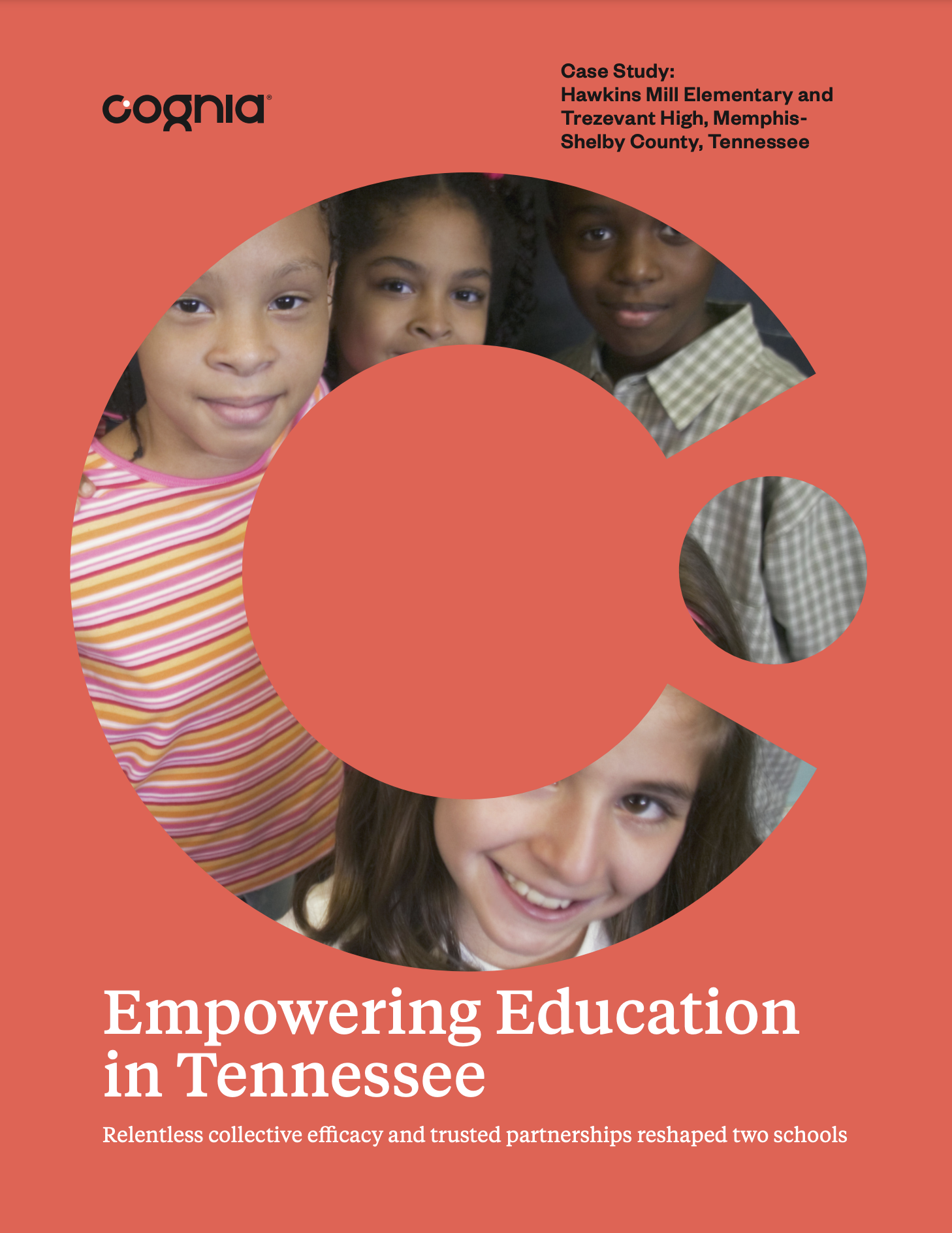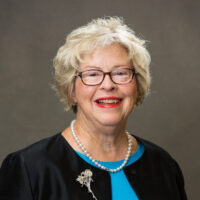To turn around a school, educators must identify and untangle a knot of factors impeding its performance. Since each school is different, turnarounds are complex work that defy a “cookie cutter” approach. However, applying proven, general principles can help educators clarify and focus on what needs to be done for their students and in what way.
In 2021, the Tennessee Department of Education (TDOE) approved Cognia’s participation in the state’s four-year school turnaround pilot program. Two schools that were participating in the pilot program—Hawkins Mill Elementary School and Trezevant High School in the Memphis-Shelby County Schools (MSCS) district—selected our Office of School Transformation as their turnaround partner.
Both Hawkins Mill and Trezevant had been on the state’s list of Priority schools (Tennessee’s designation for low-performing schools) since the list was created in the 2011–12 school year. Hawkins Mill serves more than 250 elementary students while Trezevant has just over 450 high school students.
Both schools are in an underserved, low-income urban area on the northside of Memphis where students and educators navigate social issues such as gangs and illegal drugs. The two schools were dealing with chronic absenteeism and their academic performance ranked in the state’s bottom 5%. In addition, Trezevant’s graduation rate was consistently below the state requirement of 67%.
Developing sound alliances allows for open communication about sensitive issues and forestalls culture conflicts and other possible roadblocks to the turnaround work
Building a Foundation of Trust
One of Cognia’s core principles is that school turnarounds are side-by-side, “boots on the ground” work. Consequently, collaboration was a top priority from the start. Developing sound alliances allows for open communication about sensitive issues and forestalls culture conflicts and other possible roadblocks to the turnaround work. So, while Hawkins Mill and Trezevant helped their respective Cognia Diagnostic Review teams conduct a root cause analysis of underperformance, Cognia turnaround teams regularly met with the schools’ leadership and staff to build the trust needed for close collaboration.
Understanding and becoming part of the school and district culture is another essential step in building trust. As part of our efforts, the Cognia turnaround teams attended training sessions held by MSCS’s own Innovation Zone (IZone) turnaround program. The IZone had launched in 2012, almost a decade before the state’s pilot program, and under the leadership of Dr. Thomas D. Rogers, the assistant superintendent of Memphis-Shelby County Schools, has earned a solid reputation for transforming low-performing schools.
Both Hawkins Mill Elementary and Trezevant High were members of the IZone program. The Cognia teams understood that solutions for the schools would come from everyone involved in the turnaround.
So, we shared suggestions and insights at the IZone training sessions, further gaining the confidence of Dr. Rogers and the IZone staff. As a result, Dr. Rogers encouraged us to deliver professional development of their own. In speaking about the partner support he and his staff received for their two turnaround pilot schools and in a true testament to what can be achieved with teamwork and collaboration, Dr. Rogers describes, “The dedication and commitment shown by the Cognia team have been instrumental in our schools’ transformational journey. Their unwavering support in providing innovative educational resources, professional development opportunities, and responsive customer service have significantly contributed to improving student outcomes,” he continued. “Cognia’s cooperative approach, tailored solutions, and continuous engagement with our educators have empowered us to overcome challenges and achieve remarkable progress. We are immensely grateful for their partnership and look forward to continued success in our mission to provide quality education to our all students regardless of the zip code.”
Bringing Change in Varying Forms
We delivered tailormade “job-embedded” professional development for teachers at each school and followed up by modeling the relevant practices (with the teachers’ permission) during classroom observations. However, teachers’ heavy workloads prevented more intensive training during the semester. Since Hawkins Mill Elementary and Trezevant High were both used to participating in summer IZone training, we implemented a tailormade two-day summer institute for Trezevant High’s administrators and instructional team—after consulting with Dr. Rogers—in the summer of 2022. Our workshop focused on helping them use student performance data to plan for improvement.
Not all changes required professional development or in-depth pre-planning. For example, one of the areas of improvement for Hawkins Mills Elementary was their students’ multiplication foundational skills. Educators collaborated with their Cognia turnaround team to devise ways to make the elementary school’s environment continuously learning oriented.
One of their strategies involved providing second through fifth grade students with daily multiplication quizzes. Students who achieved a score of 100 were recognized in the morning announcements. Additionally, Dr. B.J. Worthington, one of the Cognia team members, suggested the school swap all its bulletin boards for interactive learning boards and use those displays to show information that helped students with learning areas that required improvement, such as the multiplication skills.
Working Together Leads to Success and Growth
Hawkins Mill Elementary and Trezevant High achieved significant milestones on their journey toward exiting the Priority list. Between 2020 and 2022, chronic absenteeism at Hawkins Mill dropped from 29.2% to 13.6%. Similarly, the percentage of chronically absent students at Trezevant fell from 38.3% in the 2020–21 school year to 29.4% in the 2021–22 school year.
Additionally, Trezevant met the state-required graduation rate of 67%—the highest the school had experienced in more than a decade—during the 2021–22 school year. That graduation rate increased to 70% in the 2022–23 school year.
By 2023, the Tennessee Value-Added Assessment System (TVAAS), a growth-centered measure used to help evaluate whether students are improving, was showing that both Hawkins Mill Elementary School and Trezevant High School had demonstrated significant growth. What’s most striking were cases in which the students’ growth not only surpassed that of their peers in other Priority schools, but also equaled or exceeded the growth of students in similar grades throughout the state.
For example, Hawkins Mill Elementary’s third graders had the highest growth in math among any Priority school. In fact, the third graders’ growth in that subject surpassed the majority of third graders across all Tennessee schools, including in historically high-performing and more affluent schools. Hawkins Mill’s fourth graders showed growth that was on par with average fourth-grade growth across the state.
For high school students, end-of-course (EOC) tests are used to generate TVAAS growth scores. Trezevant’s growth was higher than the majority of all Priority schools across all EOC tests. In fact, Trezevant students’ growth in English II was higher than 92% of all high schools in Tennessee. Similarly, those students demonstrated more Biology growth than 77% of all other high schools.
Hawkins Mill Elementary and Trezevant High have excelled at unraveling the knot of factors blocking their students’ progress. In fact, both schools have now exited Tennessee’s list of Priority schools. Hawkins Mill met Tennessee’s exit criteria in 2022 and was even listed as a Reward School, the state’s designation for schools that show strong growth. Trezevant met the exit criteria in 2023.
Our current mission is to build the schools’ capacity for continuous improvement once the state pilot program ends…Until then, we’ll focus on enhancing the schools’ ability to sustain effective teaching and learning habits.
Setting the Course for the Future
Our current mission is to build the schools’ capacity for continuous improvement once the state pilot program ends in 2025. Until then, we’ll focus on enhancing the schools’ ability to sustain effective teaching and learning habits. We are developing lasting partnerships particularly at the high school with the Tennessee Builders Education Fund to provide industry certifications for Seniors and Juniors in collaboration with the Tennessee Homebuilders Association. These students will receive in school and summer training with a job offer after graduation. A math teacher at the high school is facilitating this work in conjunction with Memphis industry contractors who are on site at the high school.
Focusing on a collaborative approach has helped keep school faculty and leadership at Hawkins Mill and Trezevant moving forward in a unified manner. Turning around schools is complex work. No one has all the answers, but each of us has some of the answers to schools’ problems.
Read the case study for more information on the Office of School Transformation’s work in diagnostic review and school turnaround in Tennessee.
© Cognia Inc.
This article may be republished or reproduced in accordance with The Source Copyright Policy.
The information in this article is given to the reader with the understanding that neither the author nor Cognia is in engaged in rendering any legal or business advice to the user or general public. The views, thoughts, and opinions expressed in this article belong solely to the author(s), and do not necessarily reflect the official policy or position of Cognia, the author’s employer, organization, or other group or individual.


